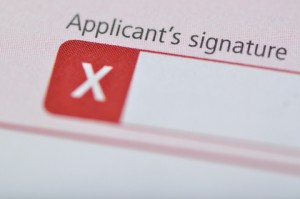 When starting a small business, you may need to register for a Federal Employer Identification Number and register your fictitious business name with state and local government.
When starting a small business, you may need to register for a Federal Employer Identification Number and register your fictitious business name with state and local government.
Getting your business appropriately registered can help you comply with tax and other rules and protect your business name and brand from being appropriated by another party.
FEIN
If you run a business, one thing you’ll need to comply with federal tax laws is a Federal Employer Identification Number, or FEIN. The Federal Employer Identification Number is essentially your business’ Social Security number, providing a way for the government to identify your business.
Even if you don’t have any employees, partnerships, LLCs and corporations need the Federal Employer Identification Number to fill out federal tax forms and local registration and business licensing forms. (If you’re a sole proprietor and have no employees, you may use your own Social Security number instead.)
Applying for a Federal Employer Identification Number for your small business is relatively easy. All you have to do is fill out and submit IRS Form SS-4 (which is available online) and submit it via the mail or through the IRS’ free Tele-TIN phone-in system.
Form SS-4 has several basic fields that you’ll need to fill out, including questions about your business name. These questions include:
1. The legal name of the person or entity applying for the Federal Employer Identification Number – If you’re a sole proprietor, enter your full name, first, last and middle initial. If your business is a partnership, enter the legal name of your partnership as it appears in your partnership agreement. If you don’t have a formal partnership agreement, enter a business name containing the surname of each partner or a trade name you intend to call the business. LLCs should enter the official name of the business as it appears on its Articles of Organization. A corporation should enter the legal name on its Articles of Incorporation.
2. Your trade name – This field asks for the name that your business will be called. This field can be left blank if the business name will be the same as the name you entered on line.
The remainder of the 18 fields of your Form SS-4 include fairly straightforward questions about the legal structure of your business, why you’re applying for a FEIN, the type of business you’re running, number of employees, etc.
Registering Your Business Name
Registering your fictitious business name, that is, the name of your business, is important to prevent confusion between two local businesses that may have the same name and to give state authorities and customers an easy way to readily identify businesses and their owners. Registration makes it easier for state regulatory authorites to investigate and handle complaints of fraud or deception on the part of business owners.
Typically, if your business is a sole proprietorship and your last name is the name of the business, (for example, Johnson Mobile Homes) you don’t have to register your fictitious business name. Partnerships using the last names of the partners also may not need to register. However, you may want to register it anyway to prevent local competitors from using your business name and confusing customers.
Corporations and LLCs do not need to file a fictitious business name statement if their business name is the same as the official name in its Articles of Incorporation or Articles of Organization.
When filing a FBN statement, many states will require you to search a FBN database to ensure that your business name doesn’t infringe on an already registered name. You may also want to do a search of state registries of corporate and LLC names to avoid infringing on another companies trademarked name.
Most states will require you to register your fictitious business name with the county clerk of the county where your primary business site will be located. This registration process is called different things in different states such as DBA (doing business as) filing, trade name registration, etc. Some states will also require you to register your business name with the secretary of state.
Once you’ve registered your FBN, in some states you’ll be required to publish it in the newspaper of record of your community.
Also, be sure to pay attention to any possible expiration date for your registration, as you’ll need to go back and re-register once it expires.
Getting your FBN registration completed is important, as many banks will decline to open an account for your business unless you have a completed FBN registration. Also, if your name isn’t registered, it won’t appear in state databases and another local business could take your name, causing you trouble, especially if you’ve already established a customer base and printed signs and t-shirts and other marketing material.
Getting the appropriate FEIN and FBN paperwork done is important, as it will head off problems with tax compliance and local and state business regulations. Do not put off this important component of successfully and legally starting a new business.









